|
Printables |
PowerPoints |
Online exercises |
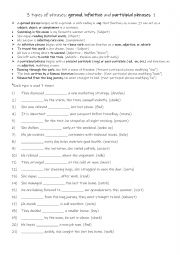
|
B1+-C1 3 types of phrases gerund, infinitive and participial phrases 1
First, students need to familiarise themselves with the 3 types of phrases and their use. Then they read the sentences to work out which one is needed to complete the gap-fill. Each verb pattern is used 7 times! Answers on page 2.
Level: intermediate
Age: 10-100
Type:
Downloads: 108
|
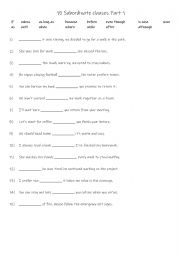
|
A2- B1 15 Subordinate clauses Part 1
Using subordinate clauses allows for more complex and nuanced sentences, helping to convey ideas clearly and effectively. Mastery of subordinate clauses can enhance writing style, making it more sophisticated and engaging. Subordinate clauses help clarify relationships between ideas, such as cause and effect or conditions, making arguments and narr...
Level: intermediate
Age: 9-100
Type:
Downloads: 101
|
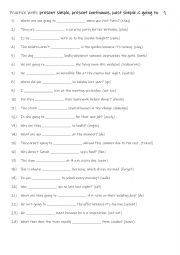
|
A1+-A2 Practice with: present simple, present continuous, past simple & going to 1
Students should practise present simple, present continuous, past simple, and going to because these tenses are essential for expressing habits, actions, past events, and future plans. They enable clear and confident communication in everyday situations, help build fluency, and provide a strong foundation for learning more advanced grammar. Masteri...
Level: elementary
Age: 8-100
Type:
Downloads: 112
|
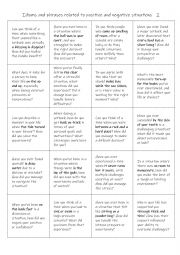
|
Idioms and phrases related to positive and negative situations 2
This is a speaking reinforcement activity to supplement the other worksheet. Students working in pairs or small groups can either ask each other the questions or answer the question themselves.
Level: intermediate
Age: 13-100
Type:
Downloads: 115
|
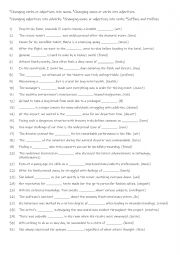
|
B1 -B2 5 Different types of word formation.
This worksheet contains the following:*Changing verbs or adjectives into nouns. *Changing nouns or verbs into adjectives.
*Changing adjectives into adverbs. *Changing nouns or adjectives into verbs *Suffixes and Prefixes. Answers on page 2.
Level: intermediate
Age: 10-100
Type:
Downloads: 104
|
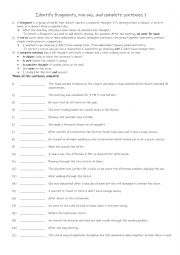
|
Identify fragments, run-ons, and complete sentences 1
First, students need to familiarise themselves with the 3 types of sentences. Then they read the sentences to work out which one is which. Each type is used 7 times! Answers on page 2
Level: elementary
Age: 9-100
Type:
Downloads: 117
|

|
5 Modals of deduction - used to make guesses or deductions about past situations. 2
Students should learn modals of deduction because they are useful for expressing logical guesses or assumptions about past situations, helping speakers show how certain or uncertain they are. These modals, such as must have, might have, could have , and can�t have, make speech sound more natural and fluent, improve communication and reasoning ski...
Level: elementary
Age: 9-100
Type:
Downloads: 106
|
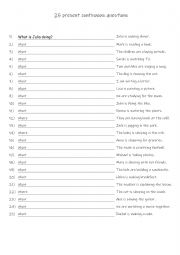
|
A1 25 Present continuous questions
Students read the answers, then they write a suitable question to get that answer. An example is given for number 1. Answers on page 2.
Level: elementary
Age: 8-100
Type:
Downloads: 101
|
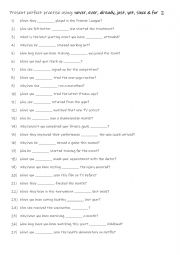
|
A2+-B1 Present perfect practise using never, ever, already, just, yet, since & for 2
Practising the present perfect with words like never, ever, already, just, yet, since, and for is essential for students as it enables them to discuss experiences, recent events, and ongoing situations with clarity. These time markers help convey whether actions are completed, in progress, or relevant to the present, which is crucial for effective ...
Level: intermediate
Age: 10-100
Type:
Downloads: 122
|
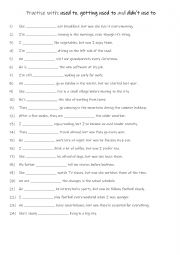
|
A2+-B1 Practise with used to, getting used to and didn�t use to
Students should learn used to, getting used to, and didn�t use to because these expressions are essential for describing past habits, changes, and adaptations. Used to highlights actions or states that were regular in the past but no longer occur, while getting used to focuses on the process of adjusting to new situations. Additionally, didn�t ...
Level: intermediate
Age: 9-100
Type:
Downloads: 131
|
|
|
|
|












